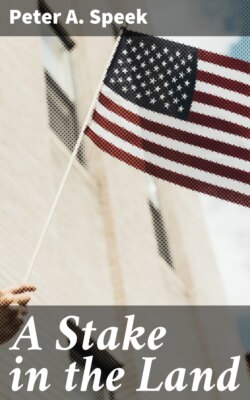Читать книгу A Stake in the Land - Peter A. Speek - Страница 17
На сайте Литреса книга снята с продажи.
FRIENDS, AGENTS, AND ADVERTISEMENTS
ОглавлениеTable of Contents
First, immigrants on the land are always desirous of increasing the number of people of their own race or nationality in their particular locality, for the sake of their own advantage; for the larger their community the better their social and business opportunities. Therefore they are often prone to exaggerate the advantages of land and farming in their section and to be silent as to the disadvantages, so as to induce more people of their race to join the community.
THE OWNER OF THIS FARM, SETTLED IN 1917, HAS PERSUADED
SIX MEMBERS OF HIS FAMILY TO BUY FARMS IN THE NEIGHBORHOOD
Second, it is quite a common practice among immigrant settlers to receive from land companies certain commissions for bringing in further settlers, which induce them to exaggerate the good qualities of the land. The usual commission in the North Middle states is fifty cents per acre. The prospective buyers of land do not usually know about this.
There are also cases where a settler has secretly become a regular agent of the land company, receiving from the latter a salary in addition to a commission on each piece of land sold through him. In such cases the agent, known to the prospective buyer only as an ordinary settler, is in a position to get much higher prices for the land than a regular agent.
Still more danger for the immigrant lurks in the scheme whereby immigrant settlers already on the land, or their native-born neighbors, seeing that new people are coming in rapidly, take options on valuable land in certain desirable localities and resell it to the newcomers at a much higher price. Near Willington, Connecticut, there is a Bohemian colony, and in the days when this colony was growing rapidly a Bohemian settler looked up land available there and took a number of options on farms for which he already had would-be buyers. He took an option on one farm for its purchase at the price of $500; to the buyer he charged $1,500, and made a clear profit of $1,000. According to a report of the Immigration Commission relating to the same colony, a man who paid $1,000 in cash for a farm found that the land "agent" who sold it to him had bought the option from the original owner for $400 a few weeks before the bargain was closed.
Quite a number of land companies are employing immigrant agents, especially of those nationalities and races with which they expect to do business on a large scale. Usually these agents are sent out to the immigrant centers in industrial towns. They bring the prospective immigrant settlers to see the land and they conduct the business in cases where the immigrants do not know English. The companies consider this the most effective way of reaching immigrants who desire to settle on land.
Another way in which immigrants learn of land opportunities is through the land companies' advertisements in the foreign-language newspapers. The immigrant newspapers, depending on a nation-wide constituency, are, as a rule, careful in accepting trade advertisements. Often the editor, before accepting the advertisement from the land company, makes a personal visit to the company's main office to find out whether the advertisement is honest or put out by schemers and crooks. According to the testimony of the land companies the editors of the foreign-language newspapers, in the vast majority of cases, are honest men who refuse to be bribed. Only in a very few cases have the editors agreed to accept commissions.
Finally comes the usual method of all land companies, that of sending out agents among the immigrants, sending them folders, etc. As a rule the advertisements and folders exaggerate the good points of the land and gloss over the bad points. Quite often the exaggerations know no bounds; the land is described as the most fertile on the surface of the earth—photographs show corn, for instance, growing like a forest; a record of the yield is given, showing it to bring hundreds and even thousands of dollars a year per acre. Such exaggerations may be illustrated by the literature sent out by the New South Farm and Home Company, advertising ten-acre farms in Florida. The representations were that the farms were not swampy, were near direct water connections with New York; that every month in the year was a growing month; that the farms were surrounded by orange and citrous-fruit farms; that there were fine roads, wells, homes, schools, hotels, etc.; that the titles were perfect; that neighboring farms were doubling, trebling, and quadrupling in price; that the settlements were rapidly growing; that there was every convenience and comfort, such as Pullman cars, long-distance telephone, etc., etc.
It is needless to say that many of these advantages were nonexistent. The decision of the Supreme Court of the United States in regard to this case was that when a proposed seller goes beyond mere exaggeration of the qualities of an article and assigns to it qualities which it does not possess, "does not simply magnify in opinion the advantages which it has, but invents advantages and falsely asserts their existence, he transcends the limit of 'puffing' and engages in false representations and pretenses." By this decision it was established that to invent advantages and falsely assert their existence in a transaction of sale is a fraud.
